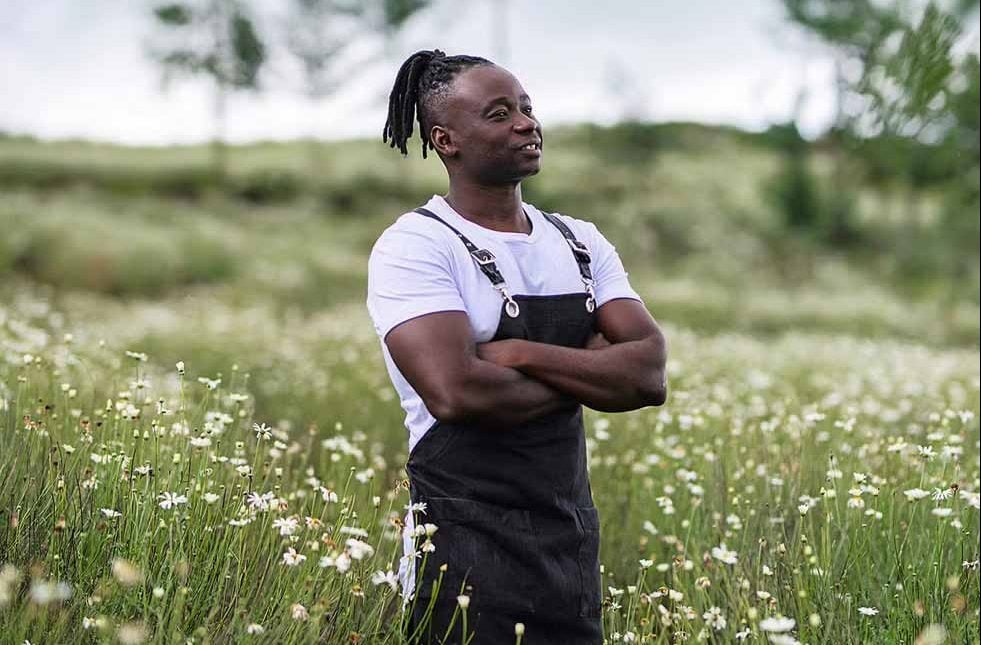
A bright and colourful dish is lowered onto the table, placed just in front of the flickering candle. Beautifully presented and mouth-wateringly enticing, the beef in honey and palm wine sauce, sweet potato puree with njangsa, and peas with dawadawa is the third course of eight (or ten if the diner so wishes!) to be served at the Meza Malonga restaurant in Kigali, Rwanda, where a dining experience can last over three hours.
Travel + Leisure and Food & Wine have both acclaimed Meza Malonga as one of the world’s best restaurants.
The kitchen is headed by award-winning Congolese chef Dieuveil Malonga (pictured), who aims to take diners on a gastronomic tour of Central and Eastern African cuisines, surprising them with tastes and ingredients they are unlikely to have experienced before.
Recognised in the Forbes Africa 30 Under 30, Malonga founded social enterprise Chefs in Africa to help train future chefs on the continent. Speaking with Africa News earlier this year, Malonga said that he aims to have the first Michelin-starred restaurant in Africa, and to “promote the continent’s outstanding chefs and unique ingredients,” adding that “this is an important time for African gastronomy.”
Reimagined for a modern palate
Indeed, Malonga and his restaurant are just one of the African restaurants and chefs whose star keeps on rising. African cuisine’s traditional dishes are being reimagined for a modern palate, featuring sustainable, locally-sourced ingredients and bold, unique flavours.
Outside the African continent, diaspora chefs who grew up and trained in Africa are taking their recipes and talent across the globe, and diners can’t get enough of them.
Senegalese pastry chef Mame Sow was born in Dakar, but emigrated to New York as a teenager and was one of the creators of the African Shoebox Bakery in Dubai. Speaking to the BBC, Sow revealed that her favourite dessert to make is her Gauteau Dakar, a vanilla cake with a baobab mousse and hibiscus jam and glaze, which she describes as “a love letter to Senegal”.
Further south in the US, Senegalese-American chef Serigne Mbaye, the owner of Dakar NOLA in Louisiana, has curated a unique menu that explores the culinary and cultural connections between Senegal and New Orleans. The menu is inspired by his childhood memories of Africa, and in 2024 Dakar NOLA won the prestigious James Beard Award in the “Best New Restaurant” category.
Nigerian chef Adejoké Bakare is the founder and head chef at Chishuru, which became one of two African restaurants in the UK to receive a Michelin star earlier this year. The restaurant began as a pop-up in September 2020 after Bakare won a local culinary competition, and, after moving venues across London, opened in its permanent location in September last year. Specialising in West African cuisine, its menu includes dishes such as mushroom purée, bean cakes and plantain.
Bakara grew up in Kaduna in northern Nigeria with a Yoruba mother and an Igbo father, which she says led to her experiencing “a wide variety of different food influences” during her childhood. Following rave reviews, Chishuru earned a place in the top 100 restaurants in the UK at the National Restaurant Awards in 2024. The chief inspector at Michelin said that Bakare’s “style is unique,” and called Chishuru “a wonderful reflection of Bakara’s personality and cooking – fun, full of life, generous and hugely enjoyable”.
Good food, decades in the making
For years prior to the explosion of African cuisine onto the global food scene, opportunities to enjoy African ingredients and food were few and far between. Most were found in very select pockets of cities such as London and Paris, which are home to large diaspora communities.
From the mid-twentieth century, grocery stores in areas of London including Brixton and Hackney started selling African foodstuffs and home-cooked food to arrivals from countries including Ghana, Sierra Leone and Nigeria, who started to come to work in the UK following labour shortages after the Second World War.
The African food scene in Paris was quicker to develop, following the arrival of citizens from North and West African countries after these gained their independence. An area near Montmartre became known as Little Africa due to its high population of African citizens.
From the late 20th century onwards, traditional African fare including fried plantain, safou fruit, baobab juice and more have been available to buy for anyone wandering through this neighbourhood.
In the 21st century, social media has played a crucial role in amplifying African cuisine to a global audience. Visual platforms including Instagram, YouTube, and TikTok have allowed African chefs to share their recipes and “Instagrammable” gastronomic creations with followers around the world. Dieuveil Malonga enjoys an Instagram following of over 25,000 with a profile full of images of enticing dishes; and Adejoké Bakare went viral on TikTok earlier this year when she became the first black woman to earn a Michelin star in the UK.
In a recent series of American reality cooking show Top Chef, Ghanaian-American contestant Eric Adjepong presented the judges with a dish of fufu. Despite being popular in West Africa for centuries, this was the first time they had come across it, and compared it in taste to Italian gnocchi. Adjepong went on to win that episode of Top Chef, and two series later, the show dedicated an entire episode to pan-African cuisine. A common thread that runs through the inspiration of these African diaspora chefs, who are enjoying success and accolades around the world, is home and family: values which are central to most communities and countries around the world.
Yet the food they create is only one part of the dining experience; equally important is the affable hospitality, the opportunity to introduce global diners to a continent of tastes and flavours, and the chance to play a part in redefining and reshaping how the world perceives African food traditions.
Top booking
In 2023, West African food represented the top trending cuisine on restaurant booking website Open Table, rising 72% year-on-year. In 2024 Adejoké Bakare and Serigne Mbaye made history by earning prestigious culinary accolades. On 11 September Nigerian chef Tolu Eros kicked offhis multi-city “A Taste of Culture” food tour, taking his pan-African creations on the road across the US.
What does the near future have in store for African gastronomy? South African restaurant chain Mozambik is making its US debut with plans to open in Houston, Texas. Senegalese chef Pierre Thiam is advocating for the sustainable West African grain fonio to become the next global superfood, following the popularity of foods such as kale and quinoa. With the star power of African cuisine continuing to grow at an astronomical rate, the sky is the limit for the continent’s culinary stage.










Comments